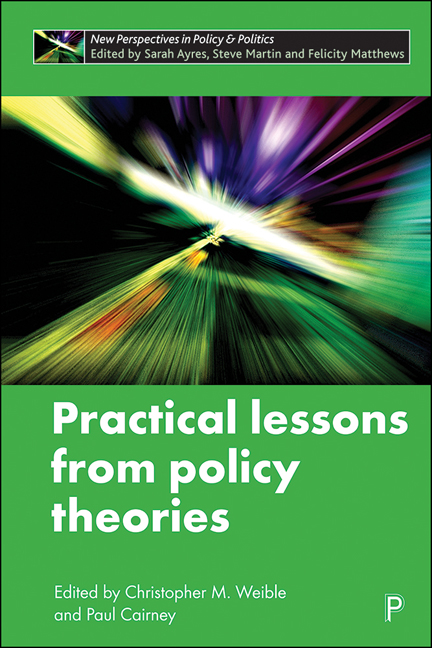Book contents
- Frontmatter
- Contents
- List of figures and tables
- Notes on contributors
- one Purposes and paths in drawing practical lessons from policy theories
- two Three habits of successful policy entrepreneurs
- three Narratives as tools for influencing policy change
- four Using cultural theory to navigate the policy process
- five The lessons of policy learning: types, triggers, hindrances and pathologies
- six Practical prescriptions for governing fragmented governments
- seven Drawing practical lessons from punctuated equilibrium theory
- eight Policy design and the added-value of the institutional analysis development framework
- nine Why advocacy coalitions matter and practical insights about them
- ten Reflections and resolutions in drawing practical lessons from policy theories
- Index
ten - Reflections and resolutions in drawing practical lessons from policy theories
Published online by Cambridge University Press: 05 January 2022
- Frontmatter
- Contents
- List of figures and tables
- Notes on contributors
- one Purposes and paths in drawing practical lessons from policy theories
- two Three habits of successful policy entrepreneurs
- three Narratives as tools for influencing policy change
- four Using cultural theory to navigate the policy process
- five The lessons of policy learning: types, triggers, hindrances and pathologies
- six Practical prescriptions for governing fragmented governments
- seven Drawing practical lessons from punctuated equilibrium theory
- eight Policy design and the added-value of the institutional analysis development framework
- nine Why advocacy coalitions matter and practical insights about them
- ten Reflections and resolutions in drawing practical lessons from policy theories
- Index
Summary
Introduction
We began this edited volume by challenging policy scholars to translate their findings to a wider audience and improve communication among academics. This volume tackled this challenge through its eight chapters that sought to draw practical lessons from various theoretical approaches.
No other book or article gathers as many theoretical perspectives with the goal of extracting practical insights, although past efforts have focused on single theoretical approaches (for example, Shipan and Volden, 2012) or synthesized lessons at a high scale of abstraction and generalizability for example, Weible et al, 2012; Cairney, 2015). In doing so, we hope to shift academic focus back towards a bugbear in public policy scholarship: relevance. Relevance has long served as a key founding aim of the field (Lasswell, 1951) but has also contributed to acrimonious debates about whether relevance should be an aim and whether the field even comes close to realising it (deLeon, 1997).
Contributions
The challenge today is not whether policy theories should make their work relevant but how it should be done. This edited volume provides a number of different ways to do so. We organise them into three categories for new and experienced policy process scholars interested in translating practical lessons from policy theories.
Contribution 1: Clearer summaries of policy theories
Each chapter summarises the state of the art developments of different theories. They help new students understand the field for the first time and experienced scholars seeking to learn what each theory now represents (since many have changed dramatically since their first exposition). This contribution is most evident in the chapters that summarise aspects of relatively complicated and dynamic policy process theories such as Punctuated Equilibrium Theory (Koski and Workman, 2021), the Advocacy Coalition Framework (Weible and Ingold, 2021), and Institutional Analysis and Development Framework (Heikkila and Andersson, 2021). These approaches have become so complicated – partly as a function of their theoretical and empirical expansion – that a single chapter can no longer describe all of their nuances. Rather, each chapter shows how key components of each perspective can be useful to specialist and non-specialist audiences. In other situations, the contributions emphasise relatively new takes on old ideas or ways of thinking, including Swann and Kim's (2021) insights from the Institutional Collective Action Framework or Simmon's (2021) work on Cultural Theory.
- Type
- Chapter
- Information
- Practical Lessons from Policy Theories , pp. 197 - 212Publisher: Bristol University PressPrint publication year: 2021

